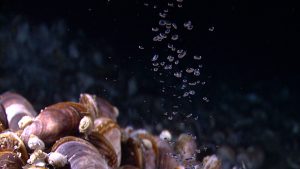Smithsonian Features GoMRI Research on Methane-Eating Microbes
– April 2, 2015
During the Deepwater Horizon incident, both oil and methane entered the surrounding marine environment from the Macondo reservoir. Scientists are investigating the released methane’s effects on deep-sea ecosystems.
The Smithsonian published a story featuring the work of three GoMRI scientists – Samantha Joye, Jeff Chanton, and Frank Hernandez – who are examining microbes that feed on methane and their impact on the Gulf of Mexico food web.
Read the Ocean Portal article to learn how methane enters and affects the Gulf food web.
For more information about hydrocarbon-degrading bacteria, read these articles:
- Study Identifies Highly-Efficient Methane-Eating Microbe Present after Oil Spill
- Study Confirms Methane-Eating Bacteria Contributed to Carbon Entering Food Web
************
GoMRI and the Smithsonian have a partnership to enhance oil spill science content on the Ocean Portal website.
The Gulf of Mexico Research Initiative (GoMRI) is a 10-year independent research program established to study the effect, and the potential associated impact, of hydrocarbon releases on the environment and public health, as well as to develop improved spill mitigation, oil detection, characterization and remediation technologies. An independent and academic 20-member Research Board makes the funding and research direction decisions to ensure the intellectual quality, effectiveness and academic independence of the GoMRI research. All research data, findings and publications will be made publicly available. The program was established through a $500 million financial commitment from BP. For more information, visit https://gulfresearchinitiative.org/.
© Copyright 2010- 2017 Gulf of Mexico Research Initiative (GoMRI) – All Rights Reserved. Redistribution is encouraged with acknowledgement to the Gulf of Mexico Research Initiative (GoMRI). Please credit images and/or videos as done in each article. Questions? Contact web-content editor Nilde “Maggie” Dannreuther, Northern Gulf Institute, Mississippi State University (maggied@ngi.msstate.edu).






